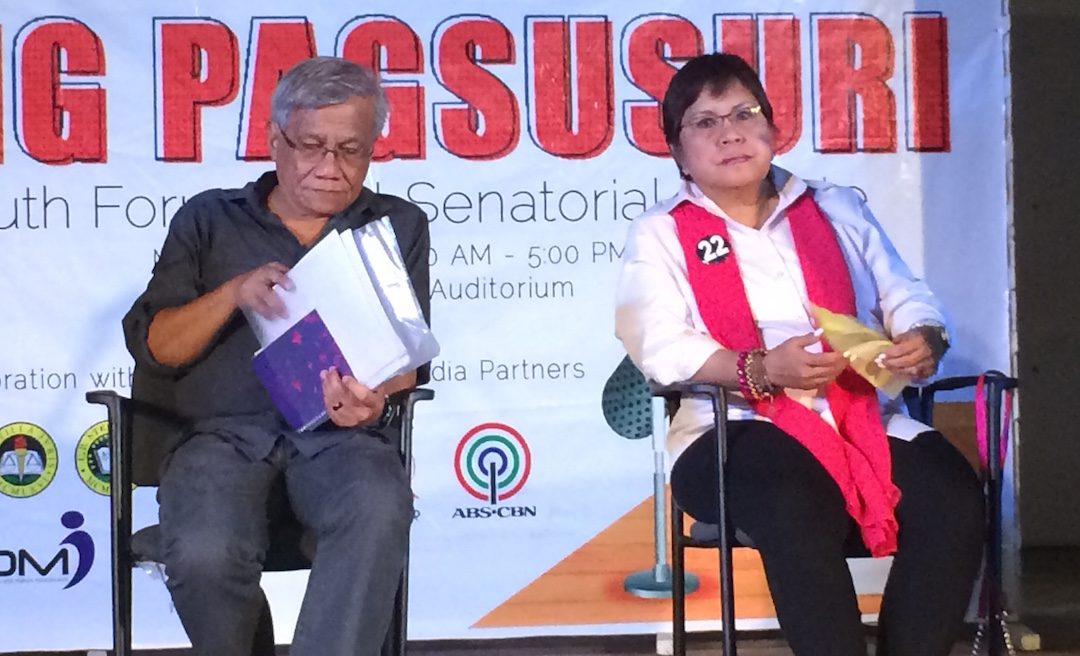SUMMARY
This is AI generated summarization, which may have errors. For context, always refer to the full article.

ILOILO CITY, Philippines – Senatorial candidates Walden Bello and Lorna Kapunan spoke to Iloilo youth on Wednesday, March 30, and pushed for reforms that will benefit young Filipinos.
Among the important points they raised during the forum organized by the National Alliance of Youth Leaders (NAYL Visayas) and Tatak Botante pertained to the following:
- Sangguniang Kabataan (SK)
- Education
- Charter for Student’s Rights and Welfare
The two criticized current policies surrounding these issues, and proposed structural changes to address them.
Their general verdict: problems like corruption and poor prioritization are putting young people at a serious disadvantage.
For Kapunan, a human rights lawyer, the current organization of the SK promotes inequality, while the privatization of education goes against the government’s mandate.
“Our current economic and political system is heavily dominated by the few elite and this will prove SK ineffective at instituting reforms,” stressed Kapunan, who added that she will not support its revival. (READ: Why the Sangguniang Kabataan needs an overhaul)
“Why is that? Because he who holds economic power wields influence over political players and decision makers,” she explained.
On the other hand, Bello, a scholar and activist, proposed accompanying legislation to address the current issues with the SK and educational system so the government can fully comply with their constitutional responsibilities.
He said the SK has been used as a breeding ground for corruption and is used by politicians, especially barangay captains, to perpetuate political dynasties and widen political control.
“If we intend to reform SK and make it as a training ground for socially conscious youth leaders, government’s intervention must be accompanied by deeper economic and social reforms,” Bello argued.
Eligibility issues
Aside from corruption in the SK, Kapunan found fault in its lack of “legal personality because its eligibility requirement states ages 18 and below,” explained Kapunan.
The Family Code of the Philippines, however, legitimizes transactions or contracts once undertaken with persons “18 years old and above,” Kapunan emphasized. (READ: What’s in the new Sangguniang Kabataan?)
“It is by 18 years old that an SK leader could legally sign contracts,” said Kapunan. “Currently, SK leaders who are below 18 years old have to depend on senior officials who are of legal age like the barangay captain,” she said.
Education and privatization
The two candidates likewise outlined their agenda on education.
For Bello, his agenda focused on correcting the lopsided budgetary priorities.
“Imagine that, out of the P2.6 trillion alone in the 2014 budget, P1 trillion went to paying debts. A big portion of it could have been used in funding education,” stressed Bello.
By compromising the allotted budget for education, he argued that it went against the government’s responsibility as provided for in the 1987 Philippine constitution. According to the constitution, education must have the lion’s share of the budget.
Bello promised that, once elected, he “will make a move to free up paying foreign and domestic debts in order to ensure that the appropriate budget is allocated to education as mandated by the Constitution.” (READ: UP education: Burden of students or the state?)
“Compliance must also mean adhering to international standards like the one set by the United Nations,” he added.
Kapunan agreed with Bello on the idea of education as the government’s responsibility, saying “it is government’s duty to maintain an education program by appropriating the necessary budget for it.”
However, Kapunan said “allocating a budget for education is not enough.” She added, “I intend to integrate programs that will help address other factors that make the cost of education expensive in our country like transportation, cost of books, food, and even the Internet.”
Kapunan also emphasized her position against the privatization of education.
“Private means profit-driven and I will not promote privatization of education. Instead, I will push for the strengthening of the public education system and it will include increasing the salary of teachers,” she explained.
Student’s charter a necessity
On top of budgetary concerns for education, Bello highlighted his priority legislative agenda for the youth by introducing the passage of a Charter for Students’ Rights and Welfare.
“I find that there is a need to pass a charter that will ensure that students’ rights will be observed and their welfare protected,” said Bello.
Bello explained that “passing a Charter for Students’ Rights and Welfare will enable the youth in school to exercise real freedom of speech and ensure the autonomy of student government and school publications.”
Moreover, “a charter will also institutionalize active participation by students in the management of the college or university and minimize abuses, including the constant raising of tuition fees,” added Bello.
Empowering voters
The post-forum assessment by NAYL-Visayas revealed that participants to the forum found the discussion informative.
“The forum allowed the two candidates to present their analyses on a range of issues and elaborate on their course of action once elected as senators,” said Gienno Niebres, vice president (VP) for social media and marketing of NAYL.
“The audience was able to properly interact with them. As it turned out, Bello and Kapunan demonstrated familiarity and competency on the issues as practicing lawyer and activist, and public intellectual, respectively,” added Niebres.
“We were able to attain our objective, why we organized Ang Pagsusuri,” said Cristina Daguno, VP for external affairs of NAYL, and that is “to inform voters in order for them to arrive at an intelligent decision come May 9 election day.” – Rappler.com
Rappler’s Iloilo Movers Russel Jude Patina, Michael Angelo Fadigani, April Joy Gaquit, Irene Olipendo, and Ted Aldwin Ong contributed to this report.
Add a comment
How does this make you feel?
There are no comments yet. Add your comment to start the conversation.